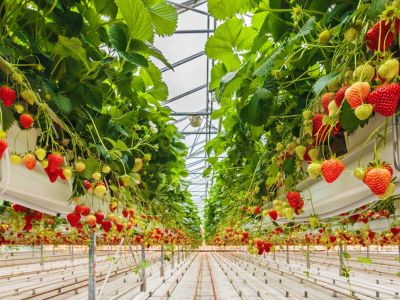Can Strawberries Be Grown Hydroponically?
Not all crops can be grown hydroponically, but as it turns out strawberries can be cultivated in a greenhouse setting. These operations have gained popularity in countries such as the Netherlands, Belgium and Germany. Yet, strawberries are grown mainly outdoors in the US. Although estimates vary, somewhere between 20,000 and 38,000 acres of land in California are dedicated to strawberry production. With so much available land for year-round strawberry production, it’s no wonder the technology for indoor strawberry farming in the US lags behind that of European and Asian countries.
Why Grow Strawberries Hydroponically?
An indoor hydroponic strawberry farm can exist anywhere. Imagine having locally grown strawberries available year round in places like New York city or Chicago. When hydroponic farming brings agriculture to urban areas, the planet benefits. Hydroponics uses less water and pesticides than traditional farming methods. Plus, it allows produce to be grown near its point of sale. It’s estimated that transporting products to market accounts for 8% of greenhouse gas emissions. This number is expected to increase substantially and possibly double by 2050. Currently, high start-up costs and inadequate research on US strawberry cultivars are the primary drawbacks to using a hydroponic system to grow strawberries in the US. Without fully understanding the cultivation requirements of different strawberry varieties, hydroponic growers face challenges for maximizing plant growth and fruit production.
Strawberry Greenhouse Cultivation Requirements
While the specific requirement for optimal strawberry production varies depending upon the cultivar, growing strawberries in a hydroponic system requires attention to these general cultivation requirements: Temperature: Plant growth, flower production and fruit size are influenced by temperature. Regulating root-zone temperature as well as ambient temperature in a hydroponic setup can improve plant growth with higher fruit yields. Light: Naturally strawberry plants require adequate light for growth, but flowering and dormancy are triggered by day length. These factors can vary depending upon whether June-bearing, everbearing or day neutral berries are being cultivated. Additionally, supplying adequate light to the top, middle and bottom of the canopy in strawberry vertical hydroponics is a challenge facing commercial growers. Nutrition: In soilless operations, water is used as a nutrient delivery system. Not only must the concentration and ratio of macro- and micronutrients be specific for strawberries, but irrigation frequency, pH levels and electrical conductivity must be targeted to the specific needs of strawberries. Humidity: Greenhouse humidity affects the strawberry plant’s ability to supply calcium to its leaves. When nighttime humidity is too low, the edges of the leaves and the calyx turn brown. (The calyx are the leaves on top of the berry.) This reduces surface area for photosynthesis and the marketability of the strawberries. Pollination: Although strawberries are self-fertile and can pollinate themselves, pollination by bees results in higher yields with bigger, better-shaped fruit. The ratio of bees to flowers and the variety of the bees are factors which affect the percentage of flowers which produce fruit. Strawberry vertical farming using hydroponics in a controlled environment is a cutting-edge industry in the US. And while more research for optimizing strawberry production is needed, lighting and HVAC technological advances are making locally grown strawberries a year-round possibility in the near future.
